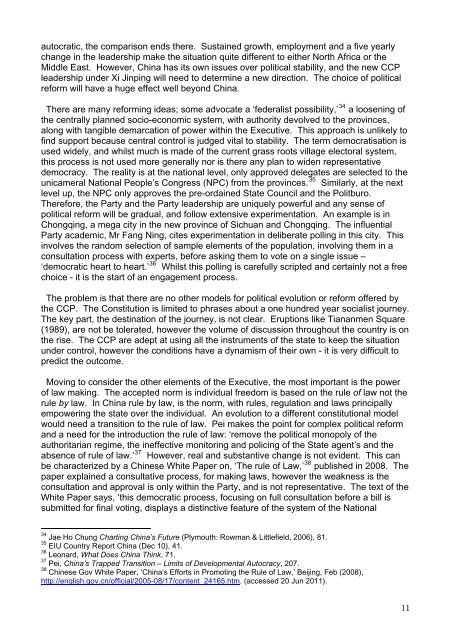to get the file - Defence Academy of the United Kingdom
to get the file - Defence Academy of the United Kingdom
to get the file - Defence Academy of the United Kingdom
You also want an ePaper? Increase the reach of your titles
YUMPU automatically turns print PDFs into web optimized ePapers that Google loves.
au<strong>to</strong>cratic, <strong>the</strong> comparison ends <strong>the</strong>re. Sustained growth, employment and a five yearly<br />
change in <strong>the</strong> leadership make <strong>the</strong> situation quite different <strong>to</strong> ei<strong>the</strong>r North Africa or <strong>the</strong><br />
Middle East. However, China has its own issues over political stability, and <strong>the</strong> new CCP<br />
leadership under Xi Jinping will need <strong>to</strong> determine a new direction. The choice <strong>of</strong> political<br />
reform will have a huge effect well beyond China.<br />
There are many reforming ideas; some advocate a ‘federalist possibility,’ 34 a loosening <strong>of</strong><br />
<strong>the</strong> centrally planned socio-economic system, with authority devolved <strong>to</strong> <strong>the</strong> provinces,<br />
along with tangible demarcation <strong>of</strong> power within <strong>the</strong> Executive. This approach is unlikely <strong>to</strong><br />
find support because central control is judged vital <strong>to</strong> stability. The term democratisation is<br />
used widely, and whilst much is made <strong>of</strong> <strong>the</strong> current grass roots village elec<strong>to</strong>ral system,<br />
this process is not used more generally nor is <strong>the</strong>re any plan <strong>to</strong> widen representative<br />
democracy. The reality is at <strong>the</strong> national level, only approved delegates are selected <strong>to</strong> <strong>the</strong><br />
unicameral National People’s Congress (NPC) from <strong>the</strong> provinces. 35 Similarly, at <strong>the</strong> next<br />
level up, <strong>the</strong> NPC only approves <strong>the</strong> pre-ordained State Council and <strong>the</strong> Politburo.<br />
Therefore, <strong>the</strong> Party and <strong>the</strong> Party leadership are uniquely powerful and any sense <strong>of</strong><br />
political reform will be gradual, and follow extensive experimentation. An example is in<br />
Chongqing, a mega city in <strong>the</strong> new province <strong>of</strong> Sichuan and Chongqing. The influential<br />
Party academic, Mr Fang Ning, cites experimentation in deliberate polling in this city. This<br />
involves <strong>the</strong> random selection <strong>of</strong> sample elements <strong>of</strong> <strong>the</strong> population, involving <strong>the</strong>m in a<br />
consultation process with experts, before asking <strong>the</strong>m <strong>to</strong> vote on a single issue –<br />
36<br />
‘democratic heart <strong>to</strong> heart.’ Whilst this polling is carefully scripted and certainly not a free<br />
choice - it is <strong>the</strong> start <strong>of</strong> an engagement process.<br />
The problem is that <strong>the</strong>re are no o<strong>the</strong>r models for political evolution or reform <strong>of</strong>fered by<br />
<strong>the</strong> CCP. The Constitution is limited <strong>to</strong> phrases about a one hundred year socialist journey.<br />
The key part, <strong>the</strong> destination <strong>of</strong> <strong>the</strong> journey, is not clear. Eruptions like Tiananmen Square<br />
(1989), are not be <strong>to</strong>lerated, however <strong>the</strong> volume <strong>of</strong> discussion throughout <strong>the</strong> country is on<br />
<strong>the</strong> rise. The CCP are adept at using all <strong>the</strong> instruments <strong>of</strong> <strong>the</strong> state <strong>to</strong> keep <strong>the</strong> situation<br />
under control, however <strong>the</strong> conditions have a dynamism <strong>of</strong> <strong>the</strong>ir own - it is very difficult <strong>to</strong><br />
predict <strong>the</strong> outcome.<br />
Moving <strong>to</strong> consider <strong>the</strong> o<strong>the</strong>r elements <strong>of</strong> <strong>the</strong> Executive, <strong>the</strong> most important is <strong>the</strong> power<br />
<strong>of</strong> law making. The accepted norm is individual freedom is based on <strong>the</strong> rule <strong>of</strong> law not <strong>the</strong><br />
rule by law. In China rule by law, is <strong>the</strong> norm, with rules, regulation and laws principally<br />
empowering <strong>the</strong> state over <strong>the</strong> individual. An evolution <strong>to</strong> a different constitutional model<br />
would need a transition <strong>to</strong> <strong>the</strong> rule <strong>of</strong> law. Pei makes <strong>the</strong> point for complex political reform<br />
and a need for <strong>the</strong> introduction <strong>the</strong> rule <strong>of</strong> law: ‘remove <strong>the</strong> political monopoly <strong>of</strong> <strong>the</strong><br />
authoritarian regime, <strong>the</strong> ineffective moni<strong>to</strong>ring and policing <strong>of</strong> <strong>the</strong> State agent’s and <strong>the</strong><br />
absence <strong>of</strong> rule <strong>of</strong> law.’ 37 However, real and substantive change is not evident. This can<br />
be characterized by a Chinese White Paper on, ‘The rule <strong>of</strong> Law,’ 38 published in 2008. The<br />
paper explained a consultative process, for making laws, however <strong>the</strong> weakness is <strong>the</strong><br />
consultation and approval is only within <strong>the</strong> Party, and is not representative. The text <strong>of</strong> <strong>the</strong><br />
White Paper says, ‘this democratic process, focusing on full consultation before a bill is<br />
submitted for final voting, displays a distinctive feature <strong>of</strong> <strong>the</strong> system <strong>of</strong> <strong>the</strong> National<br />
34 Jae Ho Chung Charting China’s Future (Plymouth: Rowman & Littlefield, 2006), 81.<br />
35 EIU Country Report China (Dec 10), 41.<br />
36 Leonard, What Does China Think, 71.<br />
37 Pei, China’s Trapped Transition – Limits <strong>of</strong> Developmental Au<strong>to</strong>cracy, 207.<br />
38 Chinese Gov White Paper, ‘China’s Efforts in Promoting <strong>the</strong> Rule <strong>of</strong> Law,’ Beijing, Feb (2008),<br />
http://english.gov.cn/<strong>of</strong>ficial/2005-08/17/content_24165.htm. (accessed 20 Jun 2011).<br />
11

















